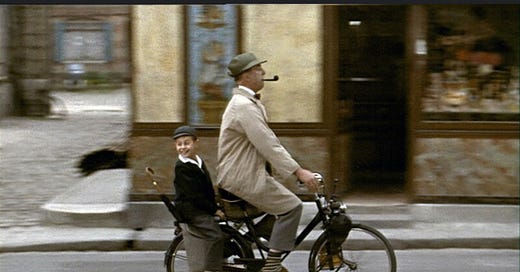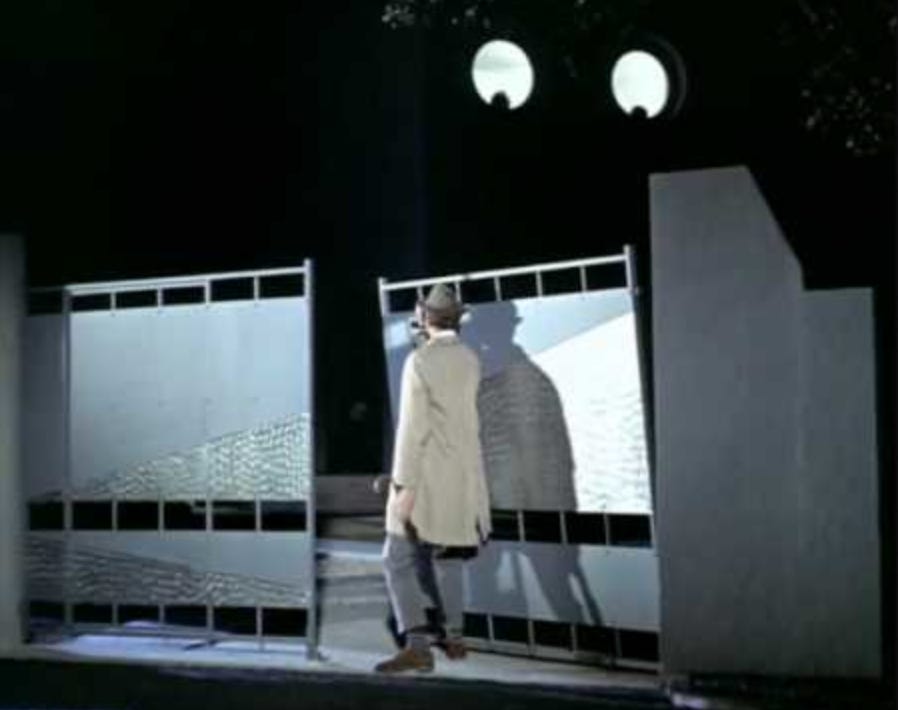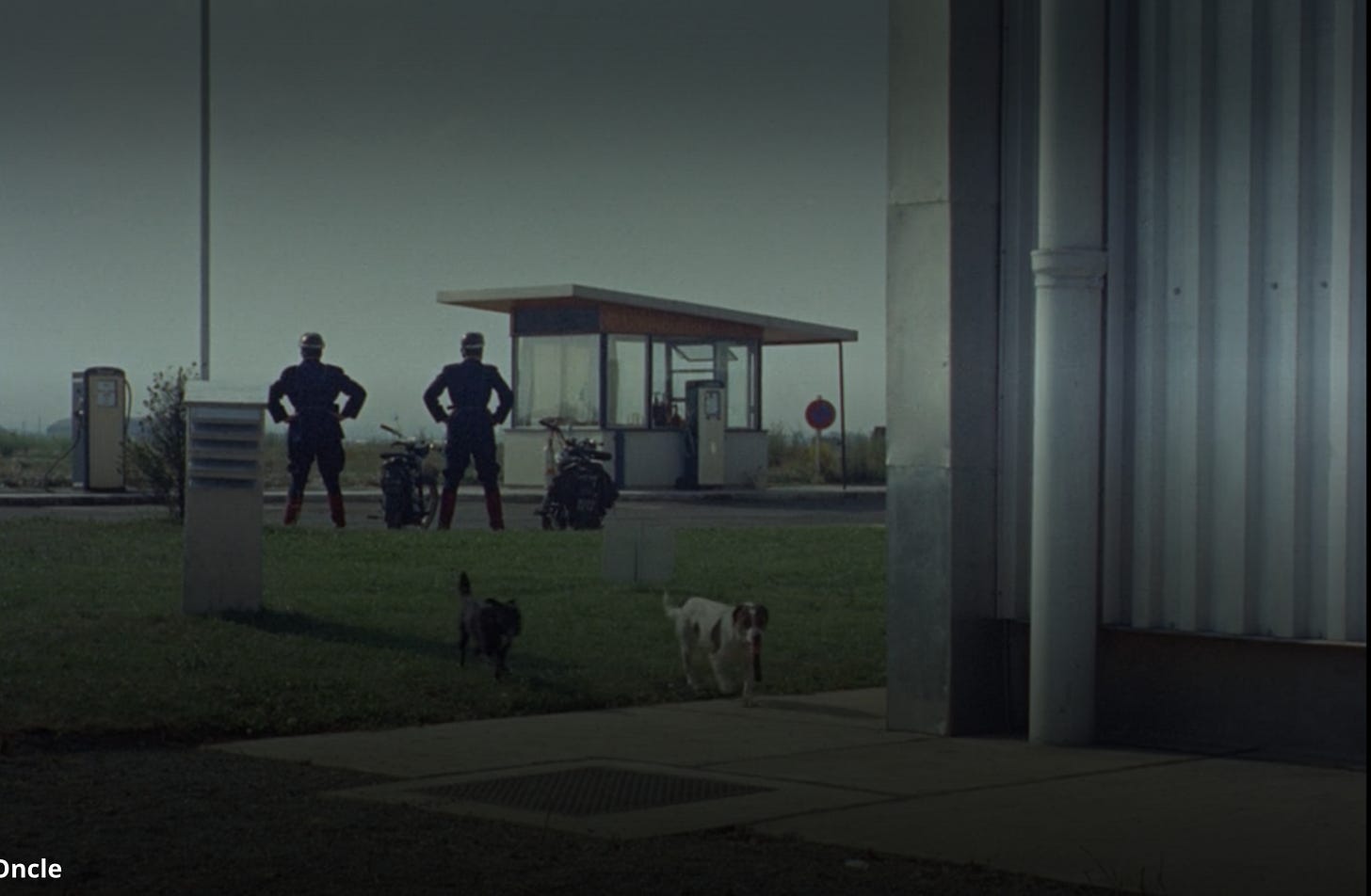There are some films every person should see at least once. Mon Oncle (1958), by Jacques Tati is one such film. Both a satire of postwar life in Paris, and a manifesto for gentle living, it’s hard not to be charmed by this movie.
Similar to Wim Wenders’ recent film Perfect Days, Tati lays out a vision for a more simple, meaningful existence. And like the protagonist of Perfect Days, the main character of Tati’s film (monsieur Hulot) encounters the world around him with appreciation, gentle wonder, and a sense of mild bemusement. Every day he wakes up, tends to his songbird, chats with the neighbors and locals, then gets on his bicycle to pick up his nephew from school
Similar to Perfect Days, in which the main character tells his niece that he and her parents live in “different worlds”, so too does monsieur Hulot lead a very different life from that of his nephew’s parents. The main character lives in old apartment in a rustic part of town, but his family live in an ultra-modern mansion. Their worlds couldn’t be more different. Hulot’s world is full of chaos and life, whereas the sanitized spaces of his brother-in-law are sterile and lifeless. As Adorno wrote in his critique on “alienated life”, the people who have everything seem to live with nothing. As he put it, “life has become the ideology of its own absence.”
And yet instead of condemning this modern way of life, Tati finds joy and comedy in the dissonance between the old and the new. As the two worlds (simple living vs. mechanized life) collide, Monsieur Hulot navigates this new world of bourgeois affectation and conspicuous consumption to great comedic effect. Consider, for example, this wonderful scene in which Monsieur Hulot tries to use the rich couple’s ultra-modern kitchen.
What I like most about this film is that it never overtly romanticizes Monsieur Hulot’s life. In some sense, he is a fool. And yet the film posits that it is precisely the fool who can see the social situation for what it is. As the French psychoanalyst Jacques Lacan put it, “The 'fool' is an innocent, a simpleton, but truths issue from his mouth.”
Lacan argued that the fool, in his very naivete, is the one who can critique the ideology of the status quo. Rather than adopting the attitude of the sage or the master, the figure of the fool (or the knave) is the one who tacitly exposes the vanities and contradictions of those who are part of social reality. As Kafka once wrote, sometimes the only way to see something the right way is to look at it the wrong way. Or, to put it more simply, the fool always inhabits a particular position of truth. He refuses -or is incapable- of presenting himself in accordance with the ideological incentives of his time, and in so doing can undermine them. Tati creates with Monsieur Hulot a seemingly naive hero, evoking Melville’s famous phrase from “Bartleby the Scrivener”: “I would prefer not to.”
This gentle refusal to participate with the demands placed upon him, makes Monsieur Hulot both a lovable fool and a tacit figure of resistance. In one of the most memorable sequences, the windows of the modern house take on the appearance of two giant eyes, with the heads of his relatives creating the illusion of eyeballs looking down at him. Here we have what one might call the disembodied gaze of the “Big Other”, the societal expectation and tacit demand that Monsieur Hulot ascribe to the norms and expectations of bourgeois existence. It is as if the house (the symbol of bourgeois security and status) is looking down at him, slightly worried about the chaos he might bring into their lives.
Indeed (without wanting to spoil the ending), after Hulot nearly causes a disaster in the factory’s production of plastic goods, his brother-in-law decides to send him to the provinces, where he will never be seen again.
Here the film provides us with a provocative parting shot. As Monsieur Hulot is dropped off at the airport, we see two police-men standing wide-legged, hands on their hips, their backs turned towards the viewer.
It is as if the film is saying to us: “see, how underneath this illusion of perfect, modern life, there is always the threat of violence?”) A pack of stray dogs (a recurrent symbol of Hulot’s anarchic spirit) approaches the police-men, then think better of it and scatter. The message is clear: Enjoy the pleasures of modern life, but there is a price to be paid. To ensure the smooth functioning of our capitalist utopia, regular people must become willing participatory “subjects” enacting the ideology of the ruling class as if it were their own. To be a person one must tacitly accept and comply with the forces that police our capitalist reality, or face deportation like poor Monsieur Hulot.
And yet this is not a polemical film. It’s a sweet, funny, and very life-affirming movie about never losing the ability to find joy and wonder in the world. It celebrates the simple things in life, like jam-sandwiches and harmless pranks. It argues that we are most alive when we are surrounded by others, and warns us against the trap of conspicuous consumption and status anxiety.
Which is to say, there are some films that serve as gentle corrections to the soul. They charm us, but also encourage us to be better people. Mon Oncle (1958), is one such film, and it is with complete confidence that I recommend it to anyone who loves movies.
Julian
“Mon Oncle” (1958), by the french filmmaker Jacques Tati, is now available on Max, as part of the Criterion series.
Thank you for reading my newsletter. I hope you’ve enjoyed this post. If you’d like to support my work please consider becoming a paying subscriber. Thank you.








Thank you for this film recommendation. Your notes and description of it however are so rich with mind popping, eye opening thoughts that I had to read it several times . I will reread it again this afternoon to let it all sink in, it will feel like I am indulging in a second excellent cup of coffee , without the guilt , but of course it so much more than that ! Your thoughts are so beautiful, inspiring and delcious . You truly brighten up and enrich my day, wake up my senses, mind and heart. I am so grateful. I wish there was someone like you in every school teaching young minds how to respond to life's beauty and humanity. ❤❤❤
I love his films! He’s a poet to me